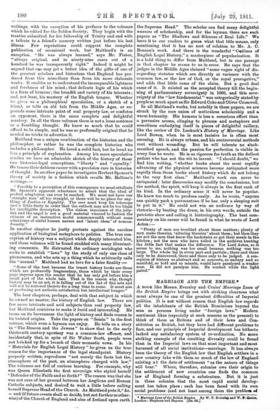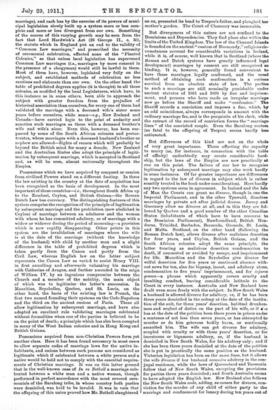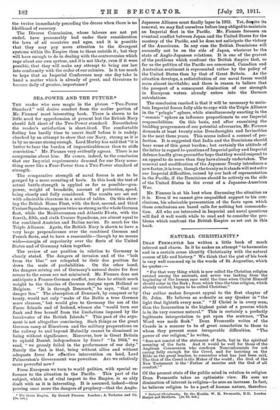MARRIAGE AND THE EMPIRE.•
A BOOK like Messrs. Eversley and Craies' Marriage Laws of the British Empire brings out with striking clearness what must always be one of the greatest difficulties of Imperial politics. It is not without reason that English law regards all the inhabitants of the British Dominions beyond the seas as persons living under " foreign laws." Modern sentiment likes (especially at such seasons as the present) to think of them as Britons and of their laws and Con- stitution as British, but they have had different problems to face, and our principle of Imperial development has hitherto lacked any satisfactory system of co-ordination. No more striking example of the resulting diversity could be found than in the Imperial laws on that most important and most harassed of all social institutions—marriage. It has always been the theory of the English law that English settlers in a new country take with them so much of the law of England existing a t the date of settlement " as the nature of things will bear." Where, therefore, colonies owe their origin to the settlement of new countries one finds the common law of England forming a substratum. But it is just in these colonies that the most rapid social develop- ment has taken place : each has been faced with its own social problems (and not least among them the problem oat • Marriage Laws of the British Empire. By W. P. Evers*/ and W. P. Ca•aies. London : Stephens and Haynes. [Vs. 6d.] marriage), and each has by the exercise of its powers of muni- cipal legislation slowly built up a system more or less com- plete and more or less divergent from our own. Something of the course of this varying growth may be seen from the fact that Lord Hardwick's Act (26 George IL, c. 33), the statute which in England put an end to the validity of -" Common Law marriages," and prescribed the necessity of ceremonial celebration, affected none of the " Planted Colonies," so that unless local legislation has supervened Common Law marriages (i.e., marriages by mere consent in the presence of a clergyman) would still be lawful in them. Most of them have, however, legislated very fully on the subject, and established methods of celebration no less cautious and elaborate than our own. On the other hand the table of prohibited degrees applies (it is thought) to all these colonies, as modified by the local Legislatures, which have, in this instance as in some others, been able to approach the subject with greater freedom from the prejudice of historical association than ourselves, for every one of them had validated the marriage with a deceased wife's sister some years before ourselves, while some—e.g., New Zealand and Canada—have carried logic to the point of audacity and sanction such marriages as those with a deceased brother's wife and wife's niece. Even this, however, has been sur- passed by some of the South African colonies and protec- torates, where marriages with a deceased husband's brother or nephew are allowed—flights of reason which will probably be beyond the British mind for many a decade. New Zealand and the Australian States also adopt the principle of legiti- mation by subsequent marriage, which is accepted in Scotland and, as will be seen, almost universally throughout the Empire.
Possessions which we have acquired by conquest or cession from civilized Powers stand on a different footing. In these the law existing in the country at the date of acquisition has been recognized as the basis of development. In the most important of these countries—i.e., throughout South Africa up to the Zambesi, Ceylon, and British Guiana—the Roman Dutch Law has currency. The distinguishing features of this system comprise the recognition of the principle of legitimation by subsequent marriage and the prohibition (now abolished in Ceylon) of marriage between an adulterer and the woman with whom he has committed adultery, or of marriage with a widow or widower during the period of mourning—a provision which is now rapidly disappearing. Other points in this system are the invalidation of marriages where the wife is at the date of the marriage (without the knowledge of the husband) with child by another man and a slight difference in the table of prohibited degrees which is taken partly from the Canon and partly from the Civil Law, whereas English law on the latter subject represents the Canon Law as varied to assist Henry VIII. in first annulling and afterwards valLiating his marriage with Catherine of Aragon, and further amended in the reign of William IV. by an ingenious compromise between the Church and a member of the nobility, the main object of which was to legitimize • the latter's succession. In Mauritius, Seychelles, Quebec, and St. Lucia, on the other hand, the basis of the existing law is French, the first two named founding their systems on the Code Napoleon and the third on the ancient custom of Paris. These all allow legitimation by subsequent marriage, and have also adopted an excellent rule validating marriages celebrated without formalities when one of the parties is believed to be on the point of death; &principle which has also been accepted in many of the West Indian colonies and in Hong Kong and British Guiana.
Possessions acquired from non-Christian Powers form yet another class. Here it has been found necessary in most cases to allow separate codes of marriage laws for the native in- habitants, and unions between such persons are considered as legitimate which if celebrated between a white person and a native would be held not to comply with the essential require- ments of Christian marriage. It was on this latter ground that in the well-known case of In re Bethell a marriage cele- brated between a white man and a native woman, though performed in perfect accordance with the most revered cere- monials of the Baralong tribe, in whose country both parties were domiciled, was held to be invalid. It was in vain that the offspring of this union proved how Mr. Bethel slaughtered
an ox, presented its head to Teepoo's father, and ploughed her mother's garden. The Court of Chancery was inexorable.
But divergences of this nature are not confined to the Dominions and Dependencies. They find place also within the limits of the United Kingdom. The law of the Channel Islands is founded on the ancient" custom of Normandy," religious cir- cumstances account for considerable variations in Ireland, while it is, of course, well known that in Scotland (where the Roman and Dutch systems have greatly influenced legal development) marriages by consent are still recognized as binding. It is, however, generally found convenient to have these marriages legally confirmed, and the usual method of obtaining such confirmation is a curious survival from an obsolete state of law. The parties to such a marriage are still nominally punishable under ancient statutes of 1661 and 1698 by fine and imprison.. ment, and persons who have made an irregular marriage now go before the Sheriff and make " confession." The Sheriff records a conviction and imposes a fine, which, by an odd coincidence, always corresponds in amount with the ordinary marriage fee, and is the perquisite of his clerk, while the extract of the record of conviction forms the " marriage lines " of the convicted couple. Even the Baralong custom (so fatal to the offspring of Teepoo) seems hardly less antiquated.
But differences of this kind are not on the whole of very great importance. Those affecting the capacity to marry (as, for instance, in connection with the table of affinity) undoubtedly may create considerable hard- ship, but the laws of the Empire are now practically at one on this point. The failure of our law to recognize legitimation by subsequent marriage may also work hardly in some instances. Of far greater importance are differences in regard to the law of divorce (a subject which is rather scantily treated in the book under consideration). Here hardly any two systems seem in agreement. In Ireland and the Isle of Man the Courts can grant no divorce, though in one the Imperial Parliament, and in the other Tynwald, dissolves marriages by private act after judicial decree. Jersey and Guernsey allow no divorce at all, and in this they are fol- lowed by Quebec and a good number of the other Canadian States (inhabitants of which have to have recourse to the Dominion Parliament), Newfoundland, British Hon- duras, Trinidad, Barbados, Bermuda, Grenada, St. Lucia, and Malta. Scotland, on the other hand (following the Roman Dutch law), allows divorce after malicious desertion for four years, and Ceylon, British Guiana, and the South African colonies adopt the same principle, the latter treating as malicious desertion condemnation to death, if commuted or avoided by escape, and imprisonment for life. Mauritius and the Seychelles give divorce for wilful desertion for five years or continued absence with- out news for ten, also for bigamy, incest, and adultery alone, condemnation to five years' imprisonment, and for injures graves—a phrase which apparently covers cruelty and insulting conduct, leaving considerable latitude to the Court in every instance. Australia and New Zealand have dealt even more freely with the subject. In New South Wales a husband is allowed divorce for adultery, or, if he has been three years domiciled in the colony at the date of the institn. tion of the suit, for three years' desertion, habitual drunken- ness and neglect of duties on the part of his wife, or if s'ie has at the date of the petition been three years in prison under a sentence of not less than seven years, or has attempted to murder or do him grievous bodily harm, or continually assaulted him. The wife can get divorce for adultery, coupled with cruelty or with three years' desertion, or for incestuous or bigamous adultery, or, if the husband is domiciled in New South Wales, for his adultery only ; and if she has been three years domiciled at the date of the petition she is put in practically the same position as the husband. Victorian legislation has been on the same lines, but it allows the wife divorce if her husband commits adultery in the con- jugal residence, while the laws of Queensland and Tasmania follow that of New South Wales, excepting the provisions for parties three years domiciled ; and South Australia seems to have adopted the English law. New Zealand also follows the New South Wales code, adding, as causes for divorce, con- viction for the murder of any child of either party to the marriage and confinement for lunacy daring ten years out of
the twelve immediately preceding the decree when there is no likelihood of recovery.
The Divorce Commission, whose labours are not yet ended, have presumably had under their consideration the laws of all countries and ages, and it is possible that they may pay more attention to the divergent systems within the Empire than to those outside it; but they will have enough to do in dealing with the controversies which rage about our own system, and it is not likely, even if it were possible, that they will make any attempt to bring our law into conformity with the codes of our colonies. Is it too much to hope that an Imperial Conference may one day take in hand a matter which is already of great, and threatens to become daily of greater, importance ?








































 Previous page
Previous page